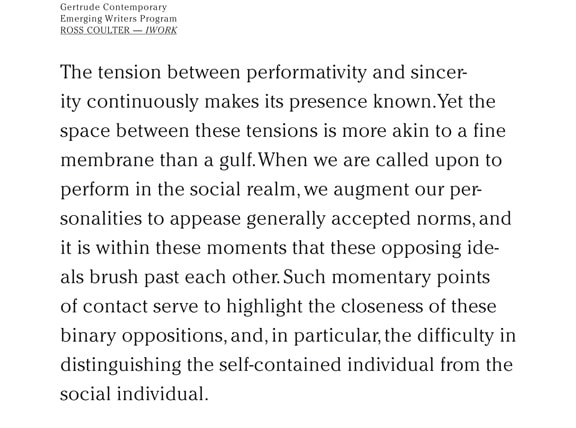programs

EMERGING WRITERS: ROSS COULTER
Download catalogue here.
The tension between performativity and sincerity continuously makes its presence known. Yet the space between these tensions is more akin to a fine membrane than a gulf. When we are called upon to perform in the social realm, we augment our personalities to appease generally accepted norms, and it is within these moments that these opposing ideals brush past each other. Such momentary points of contact serve to highlight the closeness of these binary oppositions, and, in particular, the difficulty in distinguishing the self-contained individual from the social individual.
Ross Coulter’s Studio 12 exhibition, iWork, speaks to these tensions. The exhibition consists of two single-channel videos, iWork from 2015 and Pleasantries from 2006. The videos, installed at opposite ends of Studio 12, adhere to the same structural framework. In each, Coulter as the subject speaks generic phrases directly into a static camera: best responses to job applications in the video iWork (‘I’m an experienced communicator’) and social niceties in the earlier video, Pleasantries (‘you look terrific’).
The relationship between human behaviour and language is elusive, and there is often a disjuncture between what we mean to express and what we can express within the parameters of social convention. To this end, the flattening of language signifies social conformity and the awkwardness of the interpersonal. They are a pertinent reminder that the trap of language lies in the fact that it is prescribed in standard forms which, when deployed, slightly miss their object. The standardisation of the spoken word upholds an ongoing confusion between the desires of society and the individual insofar as we come to rely upon generic statements to advance relationships.
According to Coulter, each video takes on the characteristic of ‘a self-contained bubble, but reverberating.’1 Likening their effect to that of Bruce Nauman’s Clown Torture (1987) where a clown, played by actor Walter Stevens, is filmed in a tightly sealed, white room, Coulter’s video works suggest alienation from the world at large, directly contradicting the fact that the phrases delivered by the artist signify social interaction. The deliberately constructed and controlled close shots of Coulter are explicit formal strategies called upon to communicate the constructed and insular nature of contemporary existence. For Coulter, human interactions are exercises in self-reflexive drudgery. At no point in either video do we ever believe that Coulter is engaging with somebody else on the other side of the camera, and the absence of a receiver breaks down the convention that the verbalisation of these standardised lines signifies an interaction. Yet, as Coulter says, the works are ‘reverberating’—they speak to a common human experience of struggling to breach the veil that sits between the interactive and the solitary.
Repetition as a tool for concealing nuance within the banal has become a common strategy within the artist’s practice. In these works, the artist sutures together many short scenes of identical formal structure, which he subsequently loops. It is near impossible to know where the video begins and ends and the initial response is one of ennui. However, the attentive viewer is rewarded with moments of difference and patterns that occupy the position of the unique buried amongst the prosaic.
In Pleasantries, for instance, one scene depicts Coulter bowing his head and exclaiming, ‘they’re a cute pair of jeans,’ while in the scene directly proceeding, he alters this admission slightly, saying ‘cute pair of jeans,’ switching the emphasis and nodding in a more upbeat manner. It is as though he is practicing the line, attempting to find a way of delivering it believably. These statements are at once comical and cringe-worthy. However, the variation of standard lines in combination with a certain humility carried in Coulter’s expression, and the sad humour that is elicited from the absurdity of what is said, culminate in an expression of authenticity that peeks through the performance of the social.
The nexus between banality and nuance explored by Coulter suggests that the generic, all-pervasive dullness of niceties can be mined for junctures that betray an individual’s more sincere qualities. Coulter’s is not a pessimistic view of human existence; the simplicity of iWork’s installation, which works in unison with the understated framework of the two exhibited videos, is a signal of the artist’s trust in the viewer’s capacity to unearth subtle details hidden under the surface of unassuming homogeneity.
1. Ross Coulter, conversation with the author, September 15, 2015.